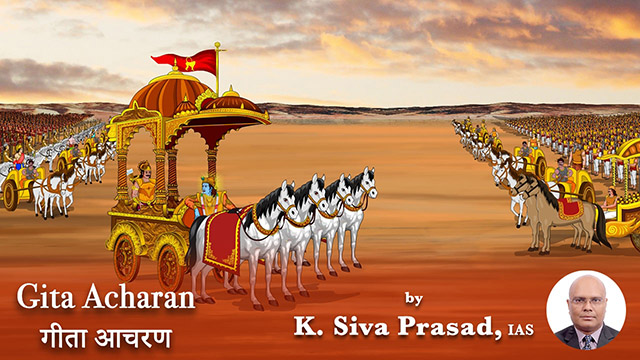
Krishna says, " 𝘼𝒉𝙞𝒎𝙨𝒂 (non-violence), 𝙎𝙖𝙩𝙮𝙖𝙢 (truthfulness), 𝘼𝙠𝙧𝙤𝙙𝙝 (freedom from anger), Renunciation, Peacefulness, Non slanderousness, Compassion for all creatures, Absence of greed, Gentleness, Modesty, Lack of restlessness" (16.2) -are divine qualities. While ahimsa is a divine quality, the violent Kurukshetra battle presents a major barrier that one needs to cross to understand the Bhagavad Gita.
Firstly, the answer to this paradox was given by Krishna earlier when he told Arjun that he would incur no sin if he fought the battle by maintaining the inner balance between pleasure-pain; gain-losses; and victory-defeat (2.38). This inner balance or 𝙨𝙖𝙢𝙖𝙩𝙫𝙖 is nothing but 𝙖𝙝𝙞𝙢𝙨𝙖. 𝘼𝙠𝙧𝙤𝙙𝙝 (freedom from anger), is another divine quality which is also a result of this inner balance. On the other hand, any action that comes out of imbalance is violence.
Secondly, Krishna says that the best Yogi is he who feels for others, whether in grief or pleasure, even as he feels for himself (6.32). It is sharing others' happiness as our happiness without jealousy; it is feeling others' pain as our pain without sadism or sarcasm. This feeling for others is 𝙖𝙝𝙞𝙢𝙨𝙖 . Slander is also a kind of violence we inflict on others by making false and defamatory statements and that's why Krishna included non slanderousness as a divine quality. Another divine quality of renunciation is nothing but dropping hatred (5.3).
Krishna earlier gave the path of seeing others in ourselves and ourselves in others (6.29-6.30). This indicates that we too possess those qualities that we criticise in others and that others too have good qualities admired by us. Realising this is nothing but attaining divine qualities of compassion for all creatures and gentleness.
𝙎𝙖𝙩𝙮𝙖𝙢 (truthfulness) is about being unconditionally truthful in both favourable and adverse situations. Once again, this stems from our inner balance.

